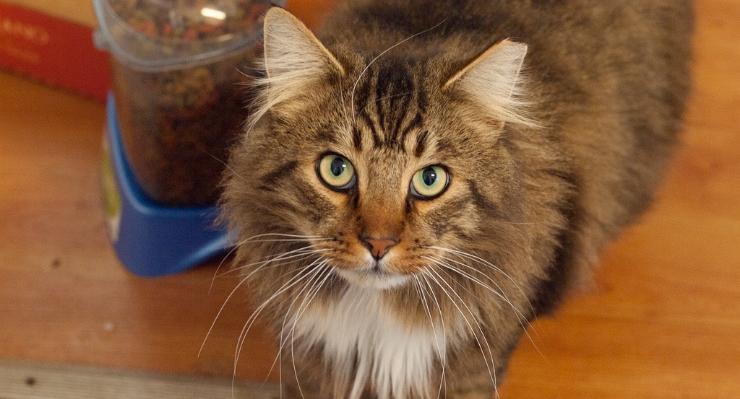
Boris, our 15-year-old gentleman cat lodger, already seemed to have dementia when he came to us in August. He’d walk around his new digs — Zeke’s old bedroom — with a puzzled look on his good-natured face.
Sometimes the elderly Maine Coon would slip down to the first floor and, once in a great while, to the cellar.
But the large basement with all its shadowy corners disoriented completely. I’d go down to retrieve him from behind the washer or furnace, and he’d stare up at me in wide-eyed panic, unable to connect with the person who sat with him and combed him every night.
Fact or Fiction?
“Cats, like their owners, are living longer than ever before,” writes William Thomas in Senior Living Magazine. “That’s the good news. With enhanced longevity comes the downside of aging — arthritis, high blood pressure, kidney problems and even dementia. If you live long enough, you’ll likely inherit these afflictions.”
A survey by Danielle Gunn-Moore, a Scottish vet, found that 28% of cats between ages 11 and 14 have feline dementia. For cats 15 and older, the number is a lot higher: 50%.
Dr. Lorie Huston, DVM, points out that cognitive dysfunction in older cats and dogs is “actually quite similar” to Alzheimer’s disease in humans. The changes in both the brain and behavior “appear to be quite similar” — although dogs are the ones “increasingly being used as models to study the disease in humans.”
The Familiarity Factor
Of course, in Boris’s case, you could argue that his confusion had more to do with suddenly being in a new place. And I’m sure that that was a factor, but not in the way that you’d think.
With human dementia patients, keeping things familiar also helps keep the disease in check for a time. The same is true for cats, I believe. “To help with their disorientation, do not move anything around,” suggests writer Dan Tiley.
Leaving furniture, their litter boxes, and their food dishes in place “will make it a lot easier for your cat to navigate around the house without becoming lost or confused.”
Does the advice sound familiar? It should — it’s the same that vets and animal behaviorists give for dealing with a blind cat.
Some of the Signs
Cats with dementia may sleep more during the day and less at night.
In fact, it’s not unusual for them to start meowing loudly once darkness falls. “The increase in vocalization can become even more prevalent during the night when a cat suffering from dementia will be restless, unable to sleep and unaware of where they are as a result of the dark,” says Tiley.
It’s almost as though they have their own version of the sundowning or “sundown syndrome” that humans with Alzheimer’s disease experience.
And, finally, the cats tend to let themselves go. Big time. So, if your cat starts looking like a ratty street person out of a Dickens novel, his cognitive abilities may be disappearing. The grooming rituals that are such a major part of a healthy cat’s life no longer matter to him.
Other Factors
I’ve had a lot of cats who’ve made it into their late teens, and few of them have shown any signs of the kind of dementia that Huston and Tiley speak of. Sure, they needed help with their grooming, but that had more to do with arthritis than it did with dementia.
But some feline diseases can lead to dementia.
- Anyone who has ever lost a beloved cat to chronic kidney disease (CKD) would give anything to forget the confused glassy-eyed look that signals the beginning of the end.
- Feline immunodeficiency virus (FIV) can also lead to dementia and seizures.
“There are numerous behavioral changes consistent with senior dementia in cats,” says Dr. Anne Fawcett, a Sydney-based veterinarian and journalist. The problem is, “none of them are specific to dementia. That means that there are other conditions that can cause these signs, so diagnosis of dementia can never be made on the basis of signs alone.”


